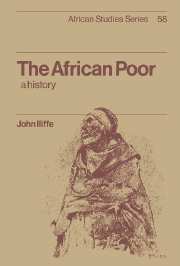Book contents
- Frontmatter
- Contents
- Preface
- 1 The comparative history of the poor
- 2 Christian Ethiopia
- 3 The Islamic tradition
- 4 Poverty and power
- 5 Poverty and pastoralism
- 6 Yoruba and Igbo
- 7 Early European initiatives
- 8 Poverty in South Africa, 1886–1948
- 9 Rural poverty in colonial Africa
- 10 Urban poverty in tropical Africa
- 11 The care of the poor in colonial Africa
- 12 Leprosy
- 13 The growth of poverty in independent Africa
- 14 The transformation of poverty in southern Africa
- Notes
- Bibliography
- Index
5 - Poverty and pastoralism
Published online by Cambridge University Press: 31 October 2009
- Frontmatter
- Contents
- Preface
- 1 The comparative history of the poor
- 2 Christian Ethiopia
- 3 The Islamic tradition
- 4 Poverty and power
- 5 Poverty and pastoralism
- 6 Yoruba and Igbo
- 7 Early European initiatives
- 8 Poverty in South Africa, 1886–1948
- 9 Rural poverty in colonial Africa
- 10 Urban poverty in tropical Africa
- 11 The care of the poor in colonial Africa
- 12 Leprosy
- 13 The growth of poverty in independent Africa
- 14 The transformation of poverty in southern Africa
- Notes
- Bibliography
- Index
Summary
Unlike land, livestock were a scarce resource in pre-colonial Africa. Pastoralists did not live in the egalitarianism often attributed to herdsmen but instead provided some of the continent's clearest evidence of poverty, defined – as they themselves defined it – by lack of livestock. Differentiation was accentuated by the riskiness of pastoral environments and the impossibility for a domestic unit to practise pure pastoralism unless it possessed a minimum number of animals. The importance of pastoralism in breeding poor people was a distinctive feature of poverty in Africa when compared with many other regions.
This chapter pursues these issues in three pastoral areas: the Saharan edge of West Africa, the Rift Valley and its environs in the east, and the cattle-keeping areas of southern Africa. Two problems receive special attention. First, pastoral peoples had to choose between two diametrically opposed strategies for dealing with their poor members. They could incorporate them into openly inegalitarian societies, as was the practice of Tuareg and Moors in West Africa and Tswana in the south, or they could exclude them from ostensibly egalitarian societies, as was done by East African herdsmen and the Khoi of southern Africa. The reasons for choosing one or other strategy are obscure, but the result was two quite different patterns of social organisation. The second problem concerns evidence. Pastoralists rarely attracted early literate observers, so that their history is especially dependent upon oral traditions and the stereotyping to which these are liable when discussing the poor.
- Type
- Chapter
- Information
- The African PoorA History, pp. 65 - 81Publisher: Cambridge University PressPrint publication year: 1987

